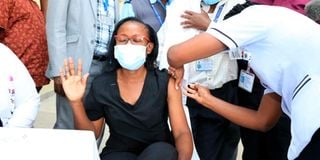Premium
The deadly virus that changed world order

Dr Philomena Owende of Kenyatta National Hospital (KNH) receives a Covid-19 vaccine jab from nurse Lucy Kipkemei on March 5, 2021 at KNH.
The Covid-19 pandemic took everyone by surprise, leaving in its wake a new world order, pushing humans to extremes, and altering how the world functions.
From a small outbreak in Wuhan, China, in December 2019, the ‘mystery disease’, first referred to as 2019-nCoV and then named Covid-19, is now a pandemic which has radically changed the world.
Flight restrictions
In February last year, countries across the world started introducing global flight restrictions, shutting down their airspaces as they scrambled to keep imported cases at bay.
China, where the virus emanated from, was now battling with a full-blown crisis, putting its multiple cities under lockdown, as it started mass testing to try and stop its spread. It was too late.
Panic and fear
By mid-February, and with the death toll climbing, panic spread across the world.
Africa reported its first case in Egypt, and most of its governments went into an overdrive— lockdowns, air space restrictions, with workplaces and schools shutting down.
PPE, testing and quarantine
Soon, there were concerns about a global shortage of personal protective equipment and testing kits to fight the pandemic.
The WHO, United Nations and private organisations like the Jack Ma Foundation stepped in to save the situation.
The UN supported various countries in the procurement of supplies, including China.
With the demand rising, the costs of these vital tools to fight the pandemic soared. Quarantine also became a way of life for travellers.
Covid-19 deaths and burials
The world also saw new burial rites emerge, sending families into agony and stigma.
With deaths soaring, governments across the world restricted the number of people attending burials. With this, funerals stopped being the celebration of lives, as it was the norm.
In Africa, health officials strictly enforced this new burial rules to the chagrin of family members.
Social guidelines
Across the world, people were adapting to new social distancing guidelines.
Countries and global organisations went on an overdrive, instilling the importance of handwashing, temperature checks and wearing of masks.
Lockdown and restrictions
As Covid-19 took hold, countries and cities across the world entered lockdown with the closure of schools, cultural and sports venues and all non-essential businesses.
Social unrests were reported in parts of Europe and South Africa as these countries battled either full or phased lockdowns.
Virtual way of doing business
With lockdowns, a new world order came in. From working, learning and even travelling, the world embraced the virtual way of doing business. Zoom calls became the phenomenon, with private corporations, educational institutions and even governments resorting to conducting business online.
Africa preparedness
While Africa appeared to suffer less from the virus than other continents, at least in terms of absolute infections and deaths, global organisations voiced concerns that the continent was not ready, both on the economic and health fronts, to fight off the virus.
Covid-19 infection waves
With the first wave of infections literally choking Europe, hope emerged as the infections rates slowed before the second and more gripping infections emerged around the world. Worst affected was Europe, Japan, South Korea and the US. In Africa, South Africa was paying the heavy price.
Covid-19 certificates
With the slow reopening of countries and travel, in came the must-have document: a Covid-19 free certificate. It is now mandatory to produce this certificate in almost all destinations across the world.
Vaccines
Even as the world battled the pandemic, scientists were working behind the scenes as they raced to find a vaccine that could stop its spread, and fatalities.
Within no time, progress had been made and by November 9, 2020, Pfizer and BioNTech announced that their vaccine was “90 per cent” effective against the virus.
In a record one month, the first person in the UK received the jab.
By the start of March this year, tens of millions across the world had already received their jabs. With more vaccines being rolled out across the world, people can only hope that this new order will soon be over. Or maybe not.





